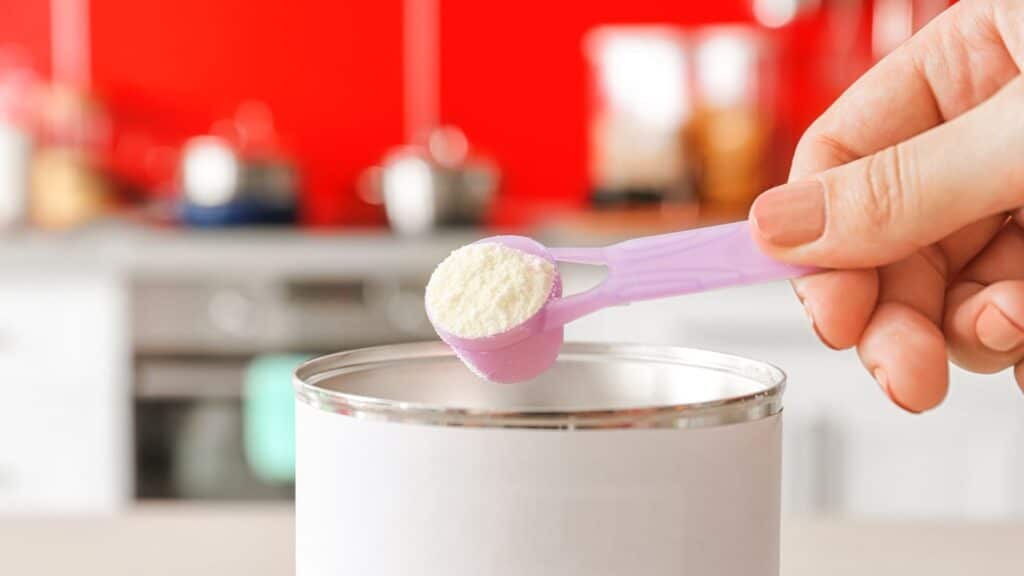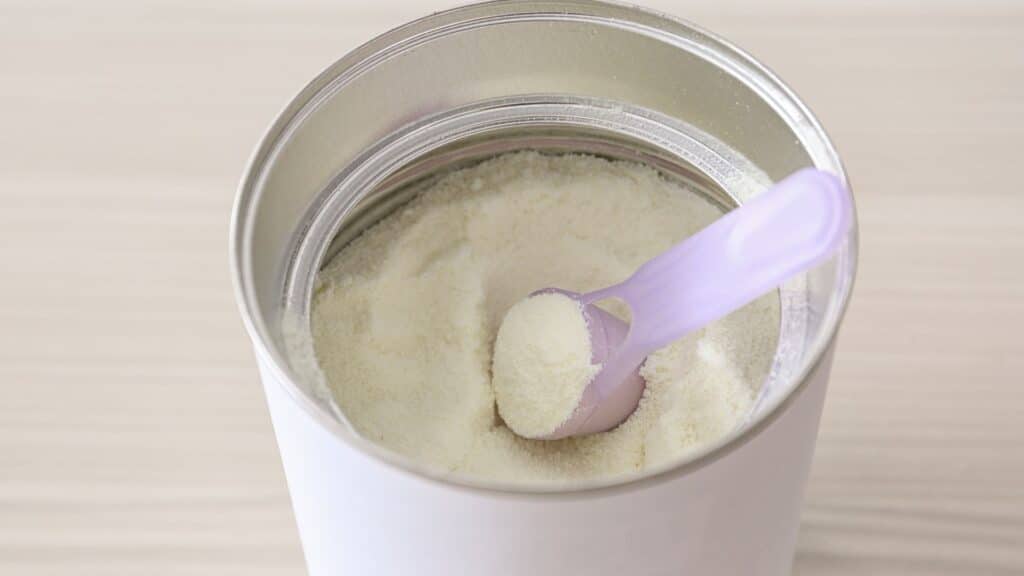The best baby formula can help reduce gas, a common problem that causes discomfort and fussiness in many babies. As a parent or caregiver, it can be challenging to watch your little one struggle with gas pains. Fortunately, there are several effective solutions available to help reduce your baby’s discomfort.
In this article, we will explore the best formula options for babies who experience gas, so you can decide what to feed your little one. From gentle formulas explicitly designed for sensitive tummies to those containing ingredients to aid digestion, we will cover a range of options to help your baby feel better and thrive. So, if you’re looking to alleviate your baby’s gas pains, keep reading to discover the best formula options for reducing your baby’s discomfort.

Understanding Gas in Babies
Gas in babies is a common issue that can cause discomfort for both the baby and the parent. It’s vital for parents to understand the causes of gas in babies and how to alleviate it. In this column, we’ll discuss the basics of gas in babies and offer tips for managing it.
Firstly, it’s essential to understand that gas is a natural part of the digestive process. Babies who swallow excess air while feeding or crying may trap it in their digestive system, leading to discomfort. Vegetables and legumes can also cause gas as they digest.
Symptoms of gas in babies include fussiness, crying, and bloating. Babies may also pass gas more frequently or have difficulty sleeping.
To alleviate excessive gas in babies, there are several techniques parents can try. These include burping your baby after feedings, changing feeding positions, and giving your baby tummy time. Massaging your baby’s tummy in a clockwise motion can also help provide baby gas relief.
It’s also important to pay attention to your baby’s diet. If you are breastfeeding, certain foods in your diet may be causing your baby’s gas. If you are formula-feeding, consider trying different formula options to see if it helps alleviate your baby’s symptoms.
In rare cases, excessive gas gas may be a sign of a more severe medical condition, such as colic or gastroesophageal reflux disease (GERD). If your baby’s symptoms persist or worsen, consult with your pediatrician for further guidance.
Primary Types of Infant Formula
Choosing the right infant formula for your baby can be overwhelming, especially with the numerous available options. However, knowing the different types of formulas can help you make an informed decision. In this column, we’ll discuss the four primary types of infant formula.
Cow’s Milk Formula
Cow’s milk formula is the most commonly used infant formula for substituting breast milk[1]. It is made from cow’s milk modified to be more easily digestible for babies. This formula is rich in nutrients, including calcium, vitamins, and minerals essential for a baby’s growth and development. Cow’s milk formula is suitable for most babies as an alternative to breast milk unless they have a cow’s milk allergy.
Soy-based Infant Formula
Soy-based infant formula is an alternative for babies allergic to cow’s milk protein and needs other sources of nutrients besides breast milk. It is made from soy protein and contains the same nutrients as cow’s milk formula. However, a soy-based infant formula may not be suitable for babies with certain medical conditions, such as thyroid problems.
Protein Hydrolysate Infant Formula
Protein hydrolysate infant formula is a specialized formula for babies with cow’s milk and soy protein allergies. It is also suitable for babies with digestive problems, such as colic or reflux. This formula contains broken-down proteins that are easier to digest.
Specialized Infant Formula
Specialized infant formula is designed for babies with specific medical conditions or nutritional needs. For instance, premature babies may need a special formula with more calories and nutrients to support their growth. Some babies may also require a lactose-free formula or fortified with iron.

When It’s Time to Consider Switching Baby Formula Products
Now that we have discussed the primary types of infant formula, it’s essential to know when it’s time to consider switching to a different formula product. While breast milk is the preferred source of nutrition for babies, organic formula is a suitable alternative when breastfeeding is not an option. However, there may be situations where switching formulas is necessary. Here are some signs to look out for:
Digestive Issues
Consider switching formulas if your baby is experiencing digestive problems, such as colic, constipation, or diarrhea. A lactose-free formula may be a suitable alternative if your baby has difficulty digesting lactose or if you have gassy baby problems.
Allergic Reactions
If your baby shows signs of an allergic reaction, such as rashes, hives, or vomiting, it may be time to switch to a different baby formula. An organic formula may be a suitable alternative for babies with food allergies or sensitivities to breast milk.
Weight Gain
If your baby is not gaining or losing weight, switching to a different formula may be time. Your pediatrician may recommend a specialized formula with more calories and nutrients to support your baby’s growth.
Feeding Issues
If your baby is having difficulty feeding or is rejecting the formula, it may be time to switch to a different baby formula. Your baby may prefer a different taste or texture, so it’s essential to experiment with different formulas to find the right one.
Reasons Your Baby Might Be Gassy
Gassy babies are common and can be caused by a variety of reasons. In this column, we’ll discuss some reasons why your baby might be gassy and how to alleviate their discomfort.
One of the reasons your baby might be gassy is due to the artificial growth hormones in some formula products. These hormones can disrupt your baby’s digestive system and cause gas. To avoid this, consider switching to organic formula, which does not contain artificial growth hormones.
Another common cause of baby gas is an intolerance to certain ingredients in the formula, such as corn syrup or lactose. In this case, a hypoallergenic formula might be the solution to alleviate your baby’s gas.
Babies can also swallow air while feeding, which can cause gas. To prevent this, make sure your baby is positioned correctly during feedings. Keeping your baby’s head higher than their stomach can help prevent air from being swallowed.
Burping your baby after feeding is another effective way to alleviate gas. It allows trapped air to escape from your baby’s stomach.
How To Choose The Right Formula For Gassy Babies
If your baby is gassy, it could be due to too much air getting into their stomach or caused by the formula they’re consuming. Breast milk is the ideal food for infants, but if that’s not an option, choosing the right baby formula can help alleviate gas and discomfort.
When looking for a formula for gassy babies, it’s essential to consider the ingredients. Some baby formulas contain artificial growth hormones or additives that can cause digestive issues. Besides breast milk, opting for a hypoallergenic formula can be a good choice as it’s specially formulated for babies with sensitive digestive systems.
The type of formula can also play a role in reducing gas. For example, a sensitive formula may be a good choice for babies who are lactose intolerant. Similarly, a formula specifically designed to reduce gas can help alleviate symptoms of baby gas.
It’s also important to consider your baby’s immune system. Babies with a weakened immune system may benefit from a formula fortified with additional nutrients, such as iron or vitamins.
When choosing a formula for a gassy baby, it’s important to introduce it gradually to give their digestive system time to adjust. It can take a few days for a baby’s digestive system to get used to a new formula, so it’s important to be patient and monitor your baby for any signs of discomfort or distress.
Formula Brands To Try For Your Baby’s Sensitive Stomach

Enfamil ProSobee Soy Sensitive Tummy Baby Formula
Enfamil ProSobee Infant Formula offers a soy-protein milk formula that uses plant-sourced protein. This alternative nutrient source suits gassy babies or those with sensitive tummies. Enfamil ProSobee provides complete nutrition that meets your child’s needs for the first 12 months. It also supports brain and eye development because of its DHA-level component.
Gerber Good Start Soothe Non-GMO Powder Infant Formula
Gerber Good Start Soothe Pro Formula is clinically shown to alleviate a gassy baby’s sensitive tummy. Similar to Enfamil, it’s also suitable for babies up to a year old, especially those with baby gas, mild spit-ups, and uncomfortable poops. The product contains active probiotic cultures which are clinically proven to promote better digestion and even reduce crying times in gassy babies. Gerber Soothe Pro also has HMO (human milk oligosaccharides), a probiotic found in the milk-based formula which almost resembles breast milk, making it ideal for breastfed babies.
Enfamil Nutramigen Hypoallergenic Colic Baby Formula
Another option for gassy babies is Enfamil Nutramigen Hypoallergenic Colic. It has a fast-relief action against a baby’s gas pain, with 90% of babies who experience gas-related comfort improving their condition within 48 hours. Nutramigen is also a lactose-free baby formula that supports your baby’s immune system, making it ideal for breastfed babies. It’s also ideal for babies with acid reflux and those with cow’s milk protein allergy.
Happy Baby Organic Infant Formula Milk-Based Powder with Iron
Patterned after human milk, this formula has organic lactose, which provides the primary nutrients and minerals that are also found in breast milk. It also provides an organic and delightfully delicious option for promoting excellent vitamins needed for your baby’s growth. You can also use it as a snack or an additional meal for your baby when stored in food pouches.
Earth’s Best Organic Low Lactose Sensitivity Infant Powder Formula with Iron
Earth’s Best Organic Low Lactose-Free Formula is another product ideal for gassy babies. These products contain pesticide-free non-GMO ingredients so that parents can feel confident when giving them to their formula-fed babies. Whether you’re looking for a formula with easy-to-digest proteins or a product that will help easy the condition of your gassy baby, Earth’s Best Organic Low Lactose Sensitivity Infant product is an excellent option.
Similac Alimentum Hypoallergenic Infant Formula
The last on the gassy baby’s formula list is Similac Alimentum Hypoallergenic Formula. This product is highly suited for babies with lactose sensitivity because of its broken-down protein, making it easier to digest. It’s also the only product that contains 2-FL HMO, an immune-nourishing ingredient that helps promote better immune development. Similac Alimentum is also an excellent product for reducing colic symptoms within 24 hours in most babies.
How Do I Relieve My Baby’s Gas Symptoms?
If your baby is experiencing gas symptoms, such as painful gas or bloating, there are several things you can do to relieve their discomfort. In addition to trying different formula brands, some simple techniques can help alleviate gas in babies.
Feed in an Upright Position
Feeding your baby upright can help prevent air from getting trapped in their digestive tract, which can cause gas. Whether you are bottle-feeding or breastfeeding, try to keep your baby in an upright position during and after feedings.
Baby Drops
Baby drops are a common remedy for gas symptoms. These drops contain simethicone, which can break up gas bubbles in your baby’s digestive tract and alleviate their discomfort.
Gentle Massaging
Gentle massaging of your baby’s tummy can also help relieve gas symptoms. Rub your baby’s tummy in a clockwise motion, applying gentle pressure.
Tummy Time
Tummy time can also be beneficial for relieving gas in babies. Laying your baby on its tummy can help push gas out of its digestive tract.
Baby Gripe water
Finally, baby gripe water is another popular remedy for gas symptoms. It contains a combination of herbs, such as ginger and fennel, that help relieve gas and bloating in babies.

Conclusion
Choosing the right formula for your baby’s sensitive stomach can significantly reduce their discomfort from gas. With various formula options available, from cow’s milk formula to specialized formulas for lactose intolerance and other digestive issues, finding the right formula for your baby may take some trial and error.
By consulting with your pediatrician and trying different options, you can help your baby say goodbye to gas and enjoy a happier, more comfortable feeding experience. Remember, while choosing the right formula can alleviate discomfort if your baby’s symptoms persist, it is essential to consult your pediatrician for further guidance.
If you have any questions, feel free to leave a comment below.



